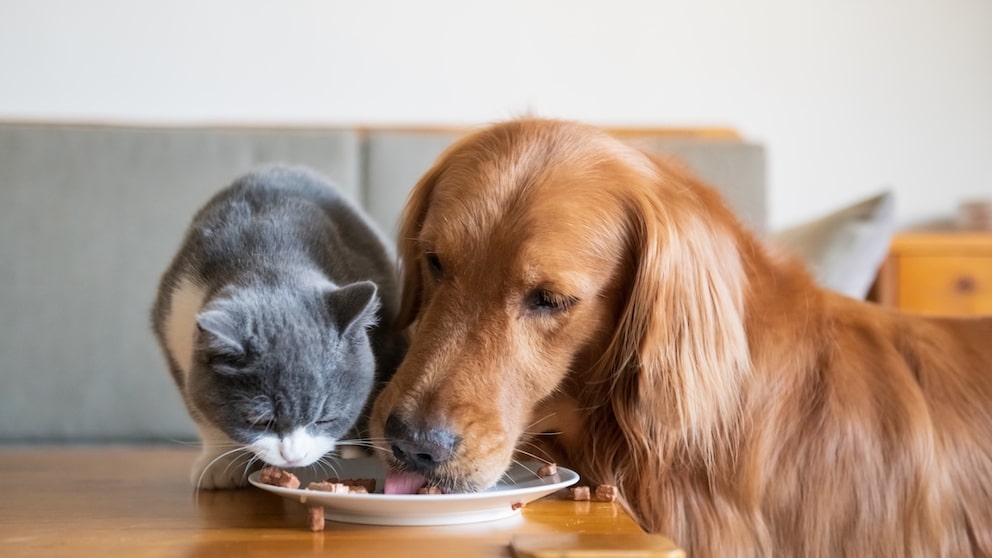July 16, 2024, 3:04 am | Read time: 3 minutes
If you have both a dog and a cat, you’ve probably wondered whether they can eat from each other’s bowls. PETBOOK author and ecotrophologist Beke Enderstein explains the nutritional differences between cat and dog food and whether cat food is suitable, unhealthy, or even better for dogs.
Being the proud owner of Jasper the dog and Findus the cat, I am familiar with the following situation: The other’s food is particularly appealing to them. In the (German) PETBOOK article “Can cats eat dog food?” I explained why dog food is not suitable for cats. One thing is for certain: cat food is generally more expensive because it has a higher meat content.
The nutritional requirements of dogs
Unlike dogs, cats are pure carnivores. Therefore, they have different nutritional requirements. As omnivores, dogs are not only allowed to eat meat, but also sufficient quantities of vegetables, and they should do so because of the numerous micronutrients. Unlike cats, dogs can utilize various nutrients from plant foods thanks to special enzymes. For this reason, their diet is much more varied.
While cat food contains only small amounts of vegetables such as peas or carrots, the recommended nutritional breakdown of dog food is made from a mix of meat or fish as the main component and moderate amounts of potatoes, zucchinis, etc. The reason is that dogs have a lower protein and fat requirement than cats, but need more carbohydrates. These carbohydrates can also come from small amounts of fruit such as blueberries, cereals such as rice or oatmeal, potatoes, or legumes.
How dog food differs from cat food
In terms of nutrition, dogs differ from cats as follows:
1. Dogs need more carbohydrates than cats.
2. Dogs need less animal protein than cats.
3. Dogs need less fat than cats.
4. Dogs need specific ratios of nutrients.
Species-appropriate dog food therefore consists largely of animal protein coming from meat and fish — or vegetarian or vegan alternatives such as yogurt, eggs, or legumes. Unlike cat food, however, dog food also contains a certain amount of carbohydrates from vegetables, potatoes, fruit, or suitable cereals such as oatmeal or rice and legumes.
Cat food not only has a higher protein content, but also a higher fat content. In addition, complete cat food provides special amounts of macronutrients, minerals, and vitamins that are tailored to the needs of cats. For example, taurine, an essential amino acid for cats that they cannot produce themselves, is added to cat food. Dog food, on the other hand, should be enriched with omega-3 fatty acids.
Health risks if dogs are only fed cat food:
If a dog is only fed cat food, it can have the following health consequences:
1. Strain on the liver and kidneys due to excess protein.
2. Higher risk of becoming overweight or obese due to high fat content.
3. Digestive disorders because of too little fiber.
4. Risk of micronutrient deficiency.
Is it bad if a dog occasionally eats cat food?
Dogs can theoretically eat cat food if there is a variety that they particularly like. I myself sometimes give Jasper some of Findus’ cat food and supplement it with vegetables, potato flakes, and the like.
However, if you decide to feed complete food — i.e., a balanced mix — you should always buy dog food, as it is specialized for the individual needs of dogs. It contains vegetables and possibly other ingredients in addition to meat.
This provides the dog with sufficient carbohydrates, less protein, and a balanced fat content, including an extra portion of vitamins and antioxidants from vegetables.
Sources

Expert clarifies Can cats eat dog food?

A health consultant explains No more cat food in the house? Here is an alternative you could feed your cat


